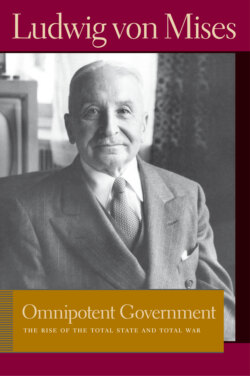Omnipotent Government

Реклама. ООО «ЛитРес», ИНН: 7719571260.
Оглавление
Людвиг фон Мизес. Omnipotent Government
CONTENTS
FOREWORD TO THE LIBERTY FUND EDITION
PREFACE
Acknowledgment
Introduction. I
II
III
IV
V
I. German Liberalism. 1. The Ancien Régime and Liberalism
2. The Weakness of German Liberalism
3. The Prussian Army
4. The Constitutional Conflict in Prussia
5. The “Little German” Program
6. The Lassalle Episode
II. The Triumph of Militarism. 1. The Prussian Army in the New German Empire
2. German Militarism
3. The Liberals and Militarism
4. The Current Explanation of the Success of Militarism
III. Etatism. 1. The New Mentality
2. The State
3. The Political and Social Doctrines of Liberalism
4. Socialism
5. Socialism in Russia and in Germany
6. Interventionism
7. Etatism and Protectionism
8. Economic Nationalism and Domestic Monopoly Prices
9. Autarky
10. German Protectionism
IV. Etatism and Nationalism. 1. The Principle of Nationality
2. The Linguistic Group
3. Liberalism and the Principle of Nationality
4. Aggressive Nationalism
5. Colonial Imperialism
6. Foreign Investment and Foreign Loans
7. Total War
8. Socialism and War
V. Refutation of Some Fallacious Explanations. 1. The Shortcomings of Current Explanations
2. The Alleged Irrationality of Nationalism
3. The Aristocratic Doctrine
4. Misapprehended Darwinism
5. The Role of Chauvinism
6. The Role of Myths
VI. The Peculiar Characteristics of German Nationalism. 1. The Awakening
2. The Ascendancy of Pan-Germanism
3. German Nationalism within an Etatist World
4. A Critique of German Nationalism
5. Nazism and German Philosophy
6. Polylogism
7. Pan-Germanism and Nazism
VII. The Social Democrats in Imperial Germany. 1. The Legend
2. Marxism and the Labor Movement
3. The German Workers and the German State
4. The Social Democrats within the German Caste System
5. The Social Democrats and War
VIII. Anti-Semitism and Racism. 1. The Role of Racism
2. The Struggle against the Jewish Mind
3. Interventionism and Legal Discrimination against Jews
4. The “Stab in the Back”
5. Anti-Semitism as a Factor in International Politics
IX. The Weimar Republic and Its Collapse. 1. The Weimar Constitution
2. The Abortive Socialization
3. The Armed Parties
4. The Treaty of Versailles
5. The Economic Depression
6. Nazism and German Labor
7. The Foreign Critics of Nazism
X. Nazism as a World Problem. 1. The Scope and Limitations of History
2. The Fallacy of the Concept of “National Character”
3. Germany’s Rubicon
4. The Alternative
XI. The Delusions of World Planning. 1. The Term “Planning”
2. The Dictatorship Complex
3. A World Government
4. Planned Production
5. Foreign Trade Agreements
6. Monetary Planning
7. Planning International Capital Transactions
XII. Peace Schemes. 1. Armament Control
2. A Critique of Some Other Schemes Proposed
3. The Union of the Western Democracies
4. Peace in Eastern Europe
5. The Problems of Asia
6. The Role of the League of Nations
Conclusion. I
II
III
IV
INDEX
A
B
C
D
E
F
G
H
I
J
K
L
M
N
O
P
Q
R
S
T
U
V
W
Y
Z
Notes. Preface
Acknowledgment
Introduction
I. German Liberalism
II. The Triumph of Militarism
III. Etatism
IV. Etatism and Nationalism
V. Refutation of Some Fallacious Explanations
VI. The Peculiar Characteristics of German Nationalism
VII. The Social Democrats in Imperial Germany
VIII. Anti-Semitism and Racism
IX. The Weimar Republic and Its Collapse
X. Nazism as a World Problem
XI. The Delusions of World Planning
XII. Peace Schemes
Conclusion. I
III
Отрывок из книги
OMNIPOTENT GOVERNMENT
Edited by Bettina Bien Greaves
.....
3. German Nationalism within an Etatist World
4. A Critique of German Nationalism
.....